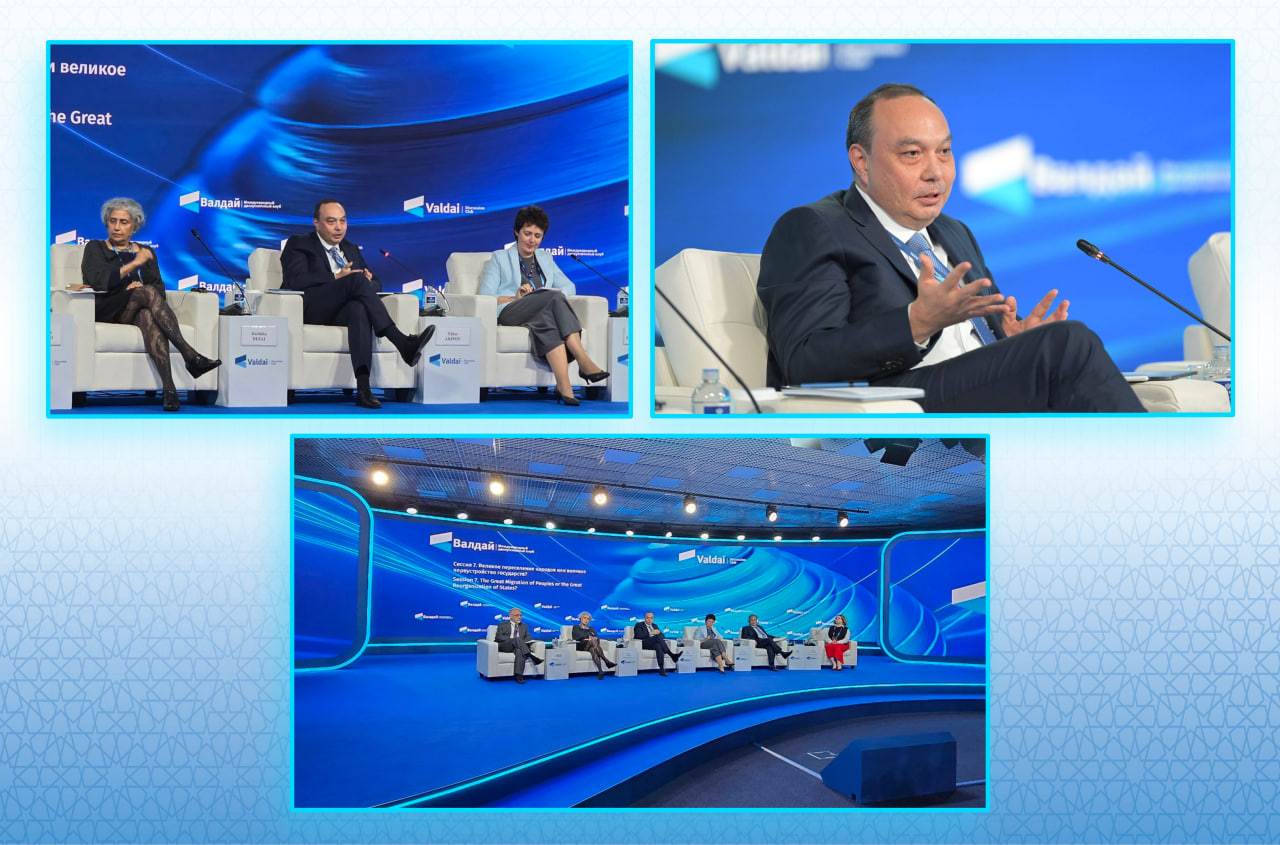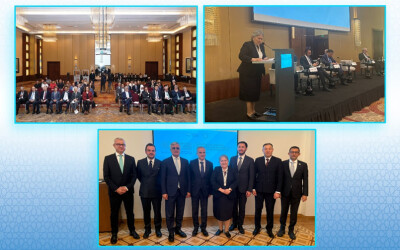Eldor Aripov took part in the 22nd annual meeting of the Valdai International Discussion Club in Sochi

The delegation of Uzbekistan, led by Eldor Aripov, Director of the Institute for Strategic and Regional Studies under the President of the Republic of Uzbekistan (ISRS), is participating in the 22nd Annual Meeting of the Valdai International Discussion Club, taking place in Sochi from 29 September to 2 October. The forum’s theme is “The Polycentric World: Instructions for Use.”
Speaking at the session “The Great Migration of Peoples or the Great Reorganization of States?”, E.Aripov stated that migration today increasingly reflects global socio-economic processes and is becoming a natural part of modern development. He noted that, according to UN data, every 25th person on the planet lives and works outside their home country.
The Director of the Institute emphasized that asymmetric demographic trends are evident in the Eurasian region. For some countries, these are challenges of an aging population and a declining share of the working-age population, while others are experiencing steady population growth and a massive influx of young people into the labor market.
These opposing trends objectively create conditions for mutual demographic synergy, where the needs of some countries can be balanced by the potential of others.
Expanding on this idea, the ISRS Director noted that states' ability to exchange people is becoming a key factor in economic growth and international competitiveness. He noted that in Germany, migrants account for approximately 5% of the country's GDP, while in Canada, the figure is 16%.
In this context, E.Aripov noted that the combined population of Central Asian countries has already exceeded 80 million people, with approximately 65% of them under 30. Moreover, the expert added, by 2050, the region's population will exceed 100 million, and the working-age population will grow from 51 to 70 million.
He also noted that the average age in Uzbekistan is only 28, and 650,000–700,000 young people enter the labor market annually. " These are not mere numbers, but a vision of the future," the specialist emphasized, adding that the country's policy is aimed at transforming demographic potential into a source of economic growth.
According to him, Uzbekistan’s example clearly demonstrates how a demographic trend can reshape the economic system. “Our path is clear: to ensure that the young generation becomes not a social burden, but the engine of sustainable development,” E. Aripov concluded.
The head of the delegation discussed in detail three key areas of Uzbekistan's strategy.
Firstly, as the Director of the Institute noted, a key priority of state policy is investing in the improvement of human capital. Over the past decade, preschool education coverage in the country has nearly tripled – from 27% to 74% – while higher education enrollment has increased more than fivefold – from 9% to 46%. The number of universities has surpassed 220, including 35 branches of foreign institutions, contributing to higher standards in the academic environment.
Particular attention is paid to the development of STEM subjects. Today, more than 500,000 schoolchildren are studying mathematics, computer science, and robotics in depth. The education system is gradually being restructured to meet the demands of the digital age. Referring to information from the World Bank, E.Aripov stated that the level of digital literacy among Uzbek youth is already comparable to that of Eastern European countries.
Secondly, Eldor Aripov noted that Uzbekistan is actively developing the format of “virtual migration,” where citizens work for global markets while remaining in their home country. According to him, there are more than 15 IT parks operating in the country, employing over 3,000 residents, with about 35 new ones registering every month.
He emphasized that digital services exports have already exceeded $900 million and are projected to reach $5 billion by 2030. Furthermore, young people are the primary driver of technological growth: every third startup is founded by people under 30. This trend indicates a qualitative shift in the economic structure.
Young people are increasingly choosing to start their own businesses, moving away from the traditional model of salaried employment. E.Aripov noted that this is an important sign of the emergence of a new knowledge economy focused on independence, creativity, and technological leadership.
Thirdly, the expert stated, Uzbekistan is focusing on a circular migration model. He noted that the country is creating conditions that allow citizens to legally work abroad, gain professional experience, and apply it to the development of the national economy.
To this end, tax and financial incentives are being provided for migrants returning to the country. Last year alone, approximately $10 million was allocated for these purposes. "As a result of the country's efforts, more than 700,000 labor migrants have returned since the beginning of 2025," the ISRS Director emphasized.
At the same time, efforts to improve the quality of labor migration are intensifying. More and more Uzbeks are choosing countries with high employment standards, and government policy is gradually adapting to these changes.
Monocenters have been established in the country, where more than 150,000 people have already been trained, and digital platforms, including SkillsUz, have been launched to verify migrant qualifications. As a result, in 2024 over 10,000 citizens were officially employed in the EU, Saudi Arabia, and Qatar. An agreement on labor mobility has been signed with Germany, and programs of professional and language training are being implemented with South Korea and Japan for work in agriculture, logistics, and technology.
In conclusion, E.Aripov emphasized the need to rethink approaches to the phenomenon of migration. "It can no longer be viewed as a short-term tool for filling labor shortages, but is becoming a systemic foundation for economic and social transformation, a strategic asset for national development, and an important element of regional and international cooperation," believes the ISRS Director.
According to him, unilateral policies of restrictions and control will only drive labor flows underground and undermine trust between states.
Against this backdrop, E.Aripov expressed confidence in the need to develop joint standards, transparent mechanisms, and flexible agreements that ensure mutually beneficial conditions for all parties-sending and receiving countries, and the migrants themselves.
The forum, organized by the Valdai Discussion Club, the Council on Foreign and Defense Policy, the Russian International Affairs Council, MGIMO University, and the National Research University Higher School of Economics, was attended by more than 140 experts from 42 countries, including Europe, Asia, Africa, the Middle East, North and South America, and Central Asia.
Among the distinguished guests and speakers at the event were Russian Foreign Minister Sergey Lavrov, Deputy Chief of Staff of the Presidential Executive Office Maxim Oreshkin, Deputy Prime Minister of the Russian Federation Alexander Novak, and Moscow Mayor Sergei Sobyanin.
Previous

On September 25, the Institute for Strategic and Regional Studies under the President of the Republic of Uzbekistan (ISRS) hosted a meeting between the Institute's Director Eldor Aripov and a delegation from the Central Party School of the Communist Party of China (CPS CPC), led by Vice President Li Yi.
25.09.2025Next

The ISRS delegation headed by Deputy Director Shafoat Nurullayeva, took part in the 11th meeting of analytical centers of the Organization of Turkic States (OTS), which took place on September 29 in Baku.
01.10.2025





